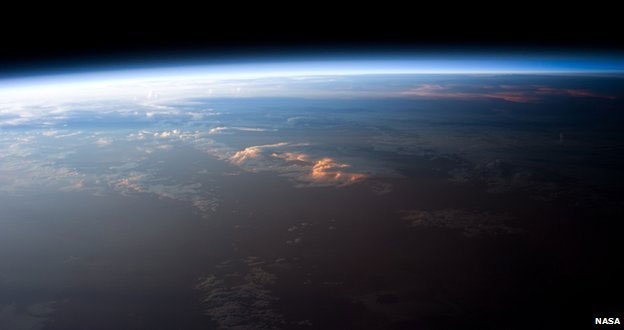Survive extraterrestrial life?
Ancient Greek philosopher Aristotle once thought that the earth was the center of the universe, and there could be no life beyond the earth.Today, astronomers have shown us that the earth is just one of the vast number of planets that can have life. Biologists have revealed to us how life on earth originated.
>>>Detecting traces of alien life
Far from the hypothesis that the earth is the only living planet, many people believe that the earth is simply a rock in the universe and they believe that in this distant universe there are certainly other lives. .

Earth is the only planet in the universe that has life. (Photo: BBC)
The world's leading scientists met at the Geographic Society in London to discuss this hot issue, raising a question 'What is the Earth's special to become the only planet to have life?'
Professor Monica Grady, a meteorite expert at the Open University of London, told the BBC why the Earth is special: The first is that the Earth has a strong magnetic field. No one knows exactly how the magnetic field works but it affects the chaotic movements that occur in the outer region of the earth's core. Without this school, we will be exposed to dangerous radiation from the sun.
The second is that we have a moon, the fifth largest natural satellite in the solar system. When the earth rotates around its axis, it will wobble around its axis but thanks to the moon reducing this swaying, preventing sudden changes in climate can be detrimental to life.
Finally the earth has tectonic plates. We live on a planet that always reuses its own layers of rock. Because this tectonic plate limits the amount of carbon dioxide released into the atmosphere, this is a natural way to control the greenhouse effect.
But what if these factors make life possible on the earth, the neighboring planets are about to die like Venus or Mars?
According to Goldilocks theory, Venus is so close to the sun that it is too hot and Mars is too far away from the sun. The earth in between these two poles should have enough temperature for life. Astronomers last week confirmed an earth-like planet in a habitable zone, orbiting a star that is no different from our sun.

Venus is a dead planet and about to disappear
However, Dr. Richard Ghail, a Venus expert at the Royal College of London, is skeptical about the Goldilocks theory. He told the BBC: ' For me, the main problem is because Venus has less density than the earth. This difference appears since the solar system was formed, there are many collisions in the universe. For Venus, these collisions create a single planet but for the Earth, lighter matter has been knocked out and formed the moon '.
'Another reason is that the materials on Venus are very easy to melt. So while the earth is composed of solids and liquid constantly moving in chaos, Venus has a fluid-filled, almost silent layer. Because the core layer does not move chaotic, it will not be possible to have magnetic fields, and so Venus is vulnerable to solar radiation, losing all the water on it. As a result, CO 2 embraces the atmosphere and the greenhouse effect takes place, leading to 1 star without life like today '.
Meanwhile, Dr. Nick Lane, a geneticist at London International University, said life could develop on planets with wet rocks.
One of the most common minerals in the universe, olivine, is filled with cosmic dust. When olivine and water meet at the bottom of the sea, they will react and produce heat. It will create an abundant source of chemical energy for living organisms to use, much easier than using solar energy. As a result, life is not limited to planets orbiting a star, but can also exist in floating asteroids in this vast universe.
However, Professor Simon Conway Morris, a renowned paleontologist at Cambridge University, is not entirely convinced by the two directions of debate. He said we rarely mention the Fermi Paradox. This is a model of 'Great silence' . If there is a lot of life in the universe, why can't we still contact them?
Since the presence of aliens cannot be verified yet, the opinions of scientists will always be divided into two directions: There are other lives in this vast universe or we are unique in the universe. deep.
- Magical survival of DNA in space
- He tried to find extraterrestrial life
- Extraterrestrial Proxima b can exist in oceans like Earth
- The tilted planet revolves around small stars that are hard to survive
- NASA extends the list of life-like planets
- NASA announced sensational announcements about extraterrestrial life?
- Russian billionaire spent $ 200 million looking for aliens
- Еuroрa hides 3 million tons of extraterrestrial organisms
- Cosmic meteorite originated from ... Earth
- NASA scientists do not believe there is life beyond Earth
- Extraterrestrial life may be more strange than thought
- Discovering the planet can survive life
 Van Allen's belt and evidence that the Apollo 11 mission to the Moon was myth
Van Allen's belt and evidence that the Apollo 11 mission to the Moon was myth The levels of civilization in the universe (Kardashev scale)
The levels of civilization in the universe (Kardashev scale) Today Mars, the sun and the Earth are aligned
Today Mars, the sun and the Earth are aligned The Amazon owner announced a secret plan to build a space base for thousands of people
The Amazon owner announced a secret plan to build a space base for thousands of people